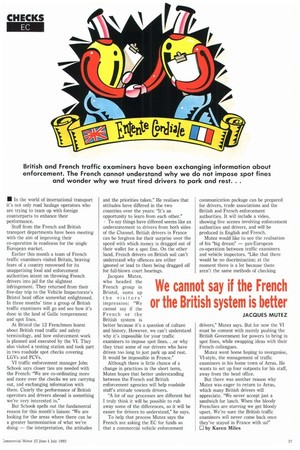British and French traffic examiners have been exchanging information about
Page 31

If you've noticed an error in this article please click here to report it so we can fix it.
enforcement. The French cannot understand why we do not impose spot fines and wonder why we trust tired drivers to park and rest. . .
• In the world of international transport it's not only road haulage operators who are trying to team up with foreign counterparts to enhance their performance.
Staff from the French and British transport departments have been meeting with the aim of improving their co-operation in readiness for the single European market.
Earlier this month a team of French traffic examiners visited Britain, braving fears of a country renowned for its unappetising food and enforcement authorities intent on throwing French drivers into jail for the slightest infringement. They returned from their five-day trip to the Vehicle Inspectorate's Bristol head office somewhat enlightened. In three months' time a group of British traffic examiners will go and see how it's done in the land of Gallic temperament and spot fines.
At Bristol the 12 Frenchmen learnt about British road traffic and safety terminology, and how enforcement work is planned and executed by the VI. They also visited a testing station and took part in two roadside spot checks covering LGVs and PCVs.
VI traffic enforcement manager John Schook says closer ties are needed with the French: "We are co-ordinating more and more over the checks we are carrying out, and exchanging information with them. Clearly the performance of British operators and drivers abroad is something we're very interested in."
But Schook spells out the fundamental reason for this month's liaison: "We are looking for the areas where there can be a greater harmonisation of what we're doing — the interpretation, the attitudes
and the priorities taken." He realises that attitudes have differed in the two countries over the years: "It's an opportunity to learn from each other."
To say things have differed seems like an understatement to drivers from both sides of the Channel. British drivers in France can be forgiven for their surprise over the speed with which money is dragged out of their wallet for a spot fine. On the other hand, French drivers on British soil can't understand why offences are either ignored or lead to them being dragged off for full-blown court hearings.
Jacques Mutez, who headed the French group in Bristol, sums up the visitors' impression: "We cannot say if the French or the British system is better because it's a question of culture and history. However, we can't understand why it's impossible for your traffic examiners to impose spot fines...or why they trust some of our drivers who have driven too long to just park up and rest. It would be impossible in France."
Although there is little chance of a change in practices in the short term, Mutez hopes that better understanding between the French and British enforcement agencies will help roadside staff's attitude towards drivers.
"A lot of our processes are different but I truly think it will be possible to rub away some of the differences, so it will be easier for drivers to understand," he says.
To help that process Mutez says the French are asking the EC for funds so that a commercial vehicle enforcement communication package can be prepared for drivers, trade associations and the British and French enforcement authorities, It will include a video, showing five scenes involving enforcement authorities and drivers, and will be produced in English and French.
Mutez would like to see the realisation of his "big dream" — pan-European co-operation between traffic examiners and vehicle inspectors. "Like that there would be no discrimination; at the moment there is a lot because there aren't the same methods of checking drivers," Mutez says. But for now the VI must be content with merely pushing the British Government for powers to bring in spot fines, while swapping ideas with their French colleagues.
Mutez went home hoping to reorganise, VI-style, the management of traffic examiners in his home town of Arras. He wants to set up four outposts for his staff, away from the head office.
But there was another reason why Mutez was eager to return to Arras, which many British drivers will appreciate. "We never accept just a sandwich for lunch. When the bloody Frenchies are starving we get bloody upset. We're sure the British traffic examiners will never come back once they've stayed in France with us!"
by Karen Miles














































































